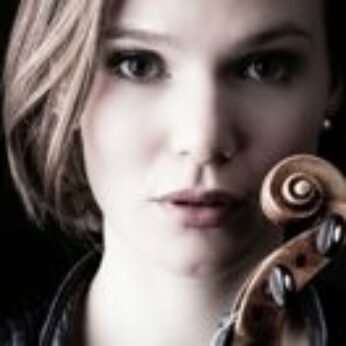Composer: György Kurtág (b. 1926)
Performance date: 02/07/2016
Venue: St. Brendan’s Church
Duration: 00:23:39
Recording Engineer: Richard McCullough, RTÉ lyric fm
Instrumentation: vn
Instrumentation Category:Solo
Artists:
Tamsin Waley-Cohen -
[violin]

Signs, Games and Messages is effectively the string counterpart to Játékok (Games), the collection of piano duets that Kurtág has been assembling steadily for more than 30 years, a continuous work-in-progress. It is a mixture of solos, duets and trios, as well as one string sextet, and each piece squeezes the last drop of expressiveness from every phrase, so that a simple scale or arpeggio can acquire immense significance. Such concentration demands equal commitment from Kurtág’s interpreters, who have been known to spend years working on his scores.
Unlike his Budapest classmate György Ligeti, who composed major works steadily throughout his later twenties and thirties, Kurtág was slow to get going as a composer. The stimulus that increased his creativity came from writing piano pieces (Játékok) for children – brevity, immediacy and playfulness became his watchwords and in this seemingly undemanding form he was able to create an enormous variety of studies, many of them homages to other composers or memorials to friends. Somehow it is appropriate that these intense miniatures had their original inspiration as studies for children.
Several commentators have pointed out that Kurtág’s music is the living embodiment of Schoenberg’s dictum that music should not be decorative but truthful. Audiences relate to the composer’s extreme concentration on essentials without being in any way aware of the depths of learning that are hidden behind the sparse notes. In nomine – all’ongharese was composed as part of the In nomine series commissioned by the German contemporary music group ensemble recherché for the Witten New Music Days festival and dedicated to its artistic director Harry Vogt. The series purported evocation of the English 17th century polyphonic tradition is here hidden from view while the homage to Hungarian folk music is in the open.
féerie d’automne is played with a practice mute, a broken line with a wisp of melody at the outer range of audibility, a musical question mark. This recital is clearly the place for one of Europe’s leading composer to pay his brief homage to the greatest exponent of the solo violin repertoire.
– Francis Humphrys
Copyright © 2024 West Cork Music. All rights reserved.
Designed and developed by Matrix Internet